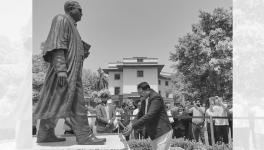MP to Bring in Anti ‘Love Jihad’ Bill Despite Existing Law against Forced Conversion
Bhopal: The Bharatiya Janata Party (BJP)-led Madhya Pradesh government on Tuesday announced that it will propose a bill against “love jihad” in the winter session of the assembly after reports of an alleged surge in love-Jihad cases in the state. The proposed law will make ‘love jihad’ a non-bailable offence attracting imprisonment up to five years.
Any political leader or organisation is yet to offer any statistics to prove the existence of or increase in ‘love jihad’.
Speaking about the proposed draft, state Home Minister Narottam Mishra said, “We will bring a draft about love jihad through ‘Madhya Pradesh Dharma Swatantrya Vidheyak 2020’ in the upcoming assembly session to stop forced religious conversion for marriage.”
He further said, “It will have provisions of rigorous imprisonment of up to five years for forcible marriage, seduction and forced conversion. The bill also proposes that the offence be cognizable and non-bailable. Provisions will also be made to declare forced marriage null and void.”
As per the draft, the collaborators in the crime will be prosecuted as the main accused. The parents and siblings of the person who has been converted need to file a complaint for an action to be taken.
“If anyone wants to convert, he/she and the religious leader carrying out the conversion have to apply before the collector a month in advance,” said Mishra referring to the draft.
Hours later, BJP MLA and protem speaker of the State Assembly, Rameshwar Sharma went a step further and claimed that the state government is also thinking of adding provisions to scrap the reservation or quota of women from the scheduled caste and scheduled tribe community if they change their faith and marry a Muslim or a Christian.
“We are also discussing a provision wherein if any woman of SC/ST community is married to a Muslim or Christian man after being converted, then she would not be entitled to the benefits of SC/ST,” he told news agency ANI.
In response to the proposed bill, Congress leader and former Law Minister P C Sharma said, “This is BJP’s political gimmick. The government first should call an assembly session and elect a fulltime speaker, then the pros and cons could be discussed.”
The Home Minister’s announcement of framing a law against alleged ‘love jihad’ aims to put a stamp on the right-wing narrative of presenting interfaith marriages as an attempt at converting Hindu women to other religions, especially Islam. The narrative has been perpetuated to curb interfaith marriages after the BJP Government rose to power at the centre.
Nevertheless, Mishra did not spell the definition of ‘love jihad’ and what prompted the State Government to frame a law against it.
MP Already has Law against Forces Conversion Marriage
Law against forcible marriage, seduction and forced conversion is nothing new in Madhya Pradesh. It was the first state to have passed such a law way back in 1968. Thus, the state got the ‘Madhya Pradesh Dharma Swatantrata Adhiniyam’, or the ‘Madhya Pradesh Freedom of Religion Act’ in 1968.
The draft of the 1968 law was prepared by the Congress government in 1954 on the recommendations of the Niyogi Committee. The committee was set up to look into the allegation that Christian missionaries were creating ‘a state within a state.’ On the basis of the committee’s findings, the Congress government had prepared the draft and proposed it in the assembly twice. But the State Assembly rejected the Freedom of Religion Bills twice in 1958 and 1963 respectively.
However, in 1968, the first non-Congress government under the banner of Samyukta Vidhayak Dal, headed by Chief Minister Govind Narayan Singh, passed the bill and enacted the law.
According to the Freedom of Religion Act, 1968, religious conversion by the use of “force” or “allurement” or by “fraudulent means” is prohibited and it is a cognizable offense.
“Allurement” has been defined as any temptation in the form of any gift or gratification either in cash or kind, grant of any material benefit, either momentary or otherwise. “Force” means threat of injury of any kind, including the threat of divine displeasure or social excommunication, while “fraud” here includes misrepresentation or any fraudulent contrivance.
Under the law, the violator will be punished with an imprisonment up to one year (two years if those being forced to convert are Scheduled Castes/Scheduled Tribes, minors or women) or fine up to Rs 5,000 (Rs 10,000 in case of minors, SC/ST, or women) or both.
As per the 1968 law, the district authorities have to be informed after any conversion. Nowhere does the law state the requirement of prior permission unlike the current draft law.
The 1968 law states: “Whoever converts any person from one religious faith to another either by performing himself the ceremony necessary for such conversion as a religious priest or by taking part directly or indirectly in such ceremony shall, within such period after the ceremony as may be prescribed, send an intimation to the District Magistrate of the district in which the ceremony has taken place of the fact of such conversion in such form as may be prescribed.”
Earlier Attempts at Tougher Law
The BJP, which returned to power in 2003 after trouncing the Digvijay Singh-led Congress government after 10 years of rule, pushed to toughen the existing law. In 2006, the BJP government sought to amend the provisions of the 1968 Act to make it more stringent. The new provisions in the amendment bill mandated that a month before a conversion ceremony is to take place, a pre-report about purification (sanskar) has to be submitted before the District Magistrate with details of the priest, kind of ceremony, date, time, place, name and address of the person who wishes to convert.
The District Magistrate has to pass on the information to the Police Superintendent who, in turn, is to find out through local investigation if any objections are there with regard to the proposed religious conversion.
When the Bill reached the then Governor Balram Jakhar, he had asked the government to submit the status of religious conversions that took place in the previous five years in the State, but the government failed to submit any supporting data. It showed that no illegal conversions had taken place. The then Solicitor General GE Vahanvati termed the Bill as unconstitutional. The Bill was forwarded to the President of India for approval and it was returned (rejected) from the President’s Office in 2009.
The BJP government didn’t stop here. Months before the Assembly election in 2013, the government again brought this issue into the public domain and proposed the bill in the assembly. After a brief discussion amidst a walkout by Congress MLAs, the bill was passed in the BJP majoritarian house.
The Bill stipulates a jail term of up to three years or a fine up to Rs 50,000, or both, for conversion using force, allurement or any other fraudulent means. When the person being converted is a minor, a woman or an SC/ST, the jail term will extend up to four years and fine up to Rs 1 lakh.
Controversy over New Proposed Law
However, owing to widespread protests by faith-based organisations, secular outfits and different political parties in the state, it was again sent to the President’s office, where it is now pending. This means that the 1968 Act is still in place.
“Although the main draft of the bill is yet to public but as per the Home Minister’s comment, it is a violation of right to religion,” said veteran advocate of MP High Court and state Congress leader Sajid Ali. “The government can ask citizens to seek permission to marry but can’t prohibit anyone from changing their faith,” he added.
“How will the government define the term ‘love jihad’ in the bill?” he asked, adding that the simple meaning of Jihad is to fight against evils including the evils of the inner self. “Jihad is a pure word which is widely being used in bad light,” he said.
While the retired district judge CS Tiwari said, “It is too early to say anything on the bill until the government publicises the said draft.”
Mohammad Anwar Siddiqui, retired High Court judge, claimed that if the government was framing law against forced marriage or forceful conversion then there was no harm in it. “Forced conversion for marriage is not only illegal as per the Indian constitution but also in Islam,” he said.
Although conversion is not banned in Madhya Pradesh, according to the provisions of the Freedom of Religion Act, the decision to allow conversion rests solely with the administration. However, the Indian Constitution’s Article 25 (1) guarantees the right to “freely profess, practice and propagate religion”. Many say the existing law also goes against the International Covenant on Civil and Political Rights, the Universal Declaration of Human Rights, and the International Convention on Elimination of Racial Discrimination, all of which India has signed.
No Case of Love-Jihad in MP
On September 14, the Satna police registered four cases against conman Sammer Singh, alias Attek Mansuri alias Sameer Khan, who had allegedly married a 16-year-old Hindu girl and divorced her after two years. Police have found multiple pan cards and letter pads of political leaders from him.
The police registered four cases against him, but none of it was under the Madhya Pradesh Freedom of Religion Act, 1968. The crime took political overtones only after state BJP president VD Sharma began calling it a "love jihad" case.
Besides, the state has neither reported any incident of forced conversion nor conviction by the court under the Freedom of Religion Act in the last couple of years, as per sources in the State Home Department office.
The most recent case was reported on May 23, 2017, when state police had arrested 10 people for allegedly trying to convert tribal children of Jhabau and Alirajpur region to Christianity. All the 71 children were rescued and the arrestee were booked under Section 3/4-4 of the 1968 Act.
However, a session court in Ratlam later acquitted all the accused as none of the parents and children supported the prosecution’s story.
Another incident of forced conversion was reported on August 30, 2014. Two Dalit youths from Shivpuri--Maniram Jatav, 30, and Tularam Jatav, 19--who converted to Islam and were also forcing their wives to change their religion, were booked under Sections 4 and 5 of the Freedom of Religion Act.
As per media reports, the police had said that Maniram Jatav, resident of Shivpuri's Khanidana village, embraced Islam two years ago, changed his name to Abdullah and started a small business in the area. Maniram also got his wife converted without completing any legal formalities.
Later, Maniram convinced his fellow villager Tularam Jatav, a labourer, for religious conversion. Tularam changed his name to Abdul Kareem in 2013. However, he was thrown out of his home by his family after the conversion. The matter surfaced after he subjected his wife to a month of torture for refusing to accept Islam. As a result, she reported the matter to her family who subsequently approached an organisation and got a complaint registered. The current status of the case is unknown.
Despite several calls and messages, Rajesh Rajora, additional Chief Secretary, Home Department, did not respond or share any official data on force conversion or forced conversion for marriage in the state.
Get the latest reports & analysis with people's perspective on Protests, movements & deep analytical videos, discussions of the current affairs in your Telegram app. Subscribe to NewsClick's Telegram channel & get Real-Time updates on stories, as they get published on our website.























